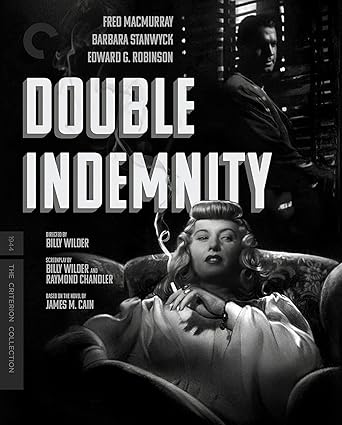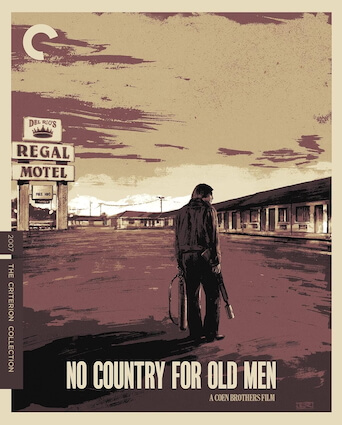No Country for Old Men and Double Indemnity might share the Criterion spotlight, but they couldn’t be more different in how they slice into the heart of darkness. The Coen brothers’ 2007 neo-Western throws you into a relentless cat-and-mouse chase where evil isn’t just a person—it’s an unstoppable force, cold and methodical like Anton Chigurh with his captive bolt pistol. It’s brutal, modern, and merciless.
Contrast that with Double Indemnity (1944), the quintessential film noir where evil oozes from greed, lust, and deception—wrapped in smoke-filled rooms, cigarette ash, and sultry lies. Here, evil is a seductive whisper, a calculated betrayal plotted over whisky and charm. Both films explore darkness, but while No Country confronts the raw, chaotic violence of fate, Double Indemnity exposes the poisonous allure of human corruption.
Two masterpieces. Two visions of evil. And both remind us why classic crime stories never go out of style.
Double Indemnity

Billy Wilder didn’t just direct Double Indemnity—he rewired Hollywood’s nervous system with it. Nearly 80 years later, this is still the noir blueprint: shadow-drenched visuals, morally bankrupt characters, and dialogue sharp enough to slash tires. It’s the story of an insurance salesman (Fred MacMurray, playing dumb just smart enough to get played) and a femme fatale (Barbara Stanwyck, cold-blooded in an anklet) who plot a murder-for-profit scheme that spirals exactly the way it should—down.
There’s no filler here. Just pure, cynical momentum. Dialogue? Forget it—nobody writes like this anymore. Wilder and Raymond Chandler turned every line into a loaded gun. Edward G. Robinson walks off with half the film just by sniffing out the truth like a bloodhound in a fedora.
Criterion’s new 4K restoration puts most modern black-and-white transfers to shame. The Dolby Vision HDR pass reveals rich contrast, clean grain, and an image that feels surgically precise—like watching a nitrate print that someone ironed and scrubbed with steel wool. Blacks are actually black, not mushy grey. And the monaural audio has been cleaned up enough that every double-cross and insult lands like a punch.
The three-disc set includes two Blu-rays with the feature and bonus content. There’s a solid documentary on Wilder’s career that reminds you just how much one man could shape a genre without ever repeating himself. And the rest of the extras add useful historical context without dragging things into film-school territory.
Wilder packed Double Indemnity with sex, murder, and fatalism at a time when censors were still having panic attacks over exposed ankles. It still sizzles. Still smolders. Still makes most modern thrillers look like watered-down cable drama. If you’ve never seen it—or worse, only streamed a crappy version—this is the way to do it. Just don’t expect a happy ending. This isn’t Hollywood. It’s Wilder.
Where to buy: $49.95 at Amazon
No Country for Old Men

The Coen Brothers’ No Country for Old Men didn’t just win Best Picture—it permanently altered the trajectory of American cinema in the 21st century. It’s as much a philosophical gut-punch as it is a slow-burn thriller, a nihilistic meditation on fate, violence, and the fragile illusion of control—all played out against the scorched desolation of West Texas. Based on Cormac McCarthy’s novel, the film captures everything cold and cruel about the modern West, without needing to raise its voice.
Javier Bardem’s Anton Chigurh isn’t a villain. He’s a force of nature in a Dutch-boy haircut, an avatar of fate armed with a cattle bolt and the world’s worst bedside manner. His every line feels carved in stone, delivered with dead-eyed calm that makes your skin crawl. He doesn’t just haunt the movie—he’s the reason it lingers. There’s a reason his coin-flip scene became an instant piece of film history: it’s menace distilled to its purest form and should be required viewing in film school, philosophy class, and anger management group.
You don’t forget that voice, that look, or the quiet threat that hangs over every second he’s on screen. He’s the reason the air feels thinner when you rewatch it—and the reason most modern “bad guys” feel like cartoon henchmen.
The Criterion Collection’s 4K UHD release gives this modern classic the technical reverence it deserves. The new 4K digital master, approved by cinematographer Roger Deakins, uses Dolby Vision HDR to full effect—darker blacks, cleaner gradients, and a dynamic range that turns dusty desert landscapes and motel shadows into brutal visual poetry.
This isn’t an upgrade—it’s the definitive version. The 5.1 DTS-HD Master Audio soundtrack is equally stark and effective, letting every silent stretch breathe, while footsteps and gunshots hit like thunderclaps.
Watching No Country for Old Men in this new transfer is a reminder that the film hasn’t aged—it’s fossilized into greatness. It doesn’t get dull with rewatching. If anything, it gets more unnerving. You see the cracks in Llewelyn Moss’s confidence sooner. You hear the weary resignation in Tommy Lee Jones’ voice more clearly. And you start to realize just how little separates order from chaos.
The bonus features here are less about fan service and more about stripping back the film’s cool, clinical shell to reveal just how much thought and precision went into every frame.
A new conversation with the Coen brothers and author Dave Eggers offers an honest, often dryly funny look at the Coens’ creative process—refreshingly free of ego or mythologizing. Roger Deakins steps in to dissect four key scenes, turning what could have been standard commentary into a mini masterclass in cinematography.
Interviews with Josh Brolin, Javier Bardem, and Tommy Lee Jones range from thoughtful to cryptic, showcasing the kind of old-school acting insights that rarely make it into press junkets.
The set also includes an excerpt from a 2018 tribute to the Coens featuring Guillermo del Toro, Alec Baldwin, and others, behind-the-scenes footage, a vintage making-of documentary from 2008, trailers, and an essay by novelist Jonathan Lethem that, unlike most liner-note fluff, is actually worth reading.
This one isn’t for the kids. Hell, it’s barely for the adults. Before I started 13 weeks of inpatient therapy, someone handed me this disc as a gift. I watched it alone, and it stayed with me for weeks. Cormac McCarthy doesn’t write happy endings, and the Coens didn’t give you any illusions to cling to. This is cinema at its most unforgiving—and Criterion’s new 4K release preserves that chill right down to the last coin toss.
Where to buy: $49.95 at Amazon
